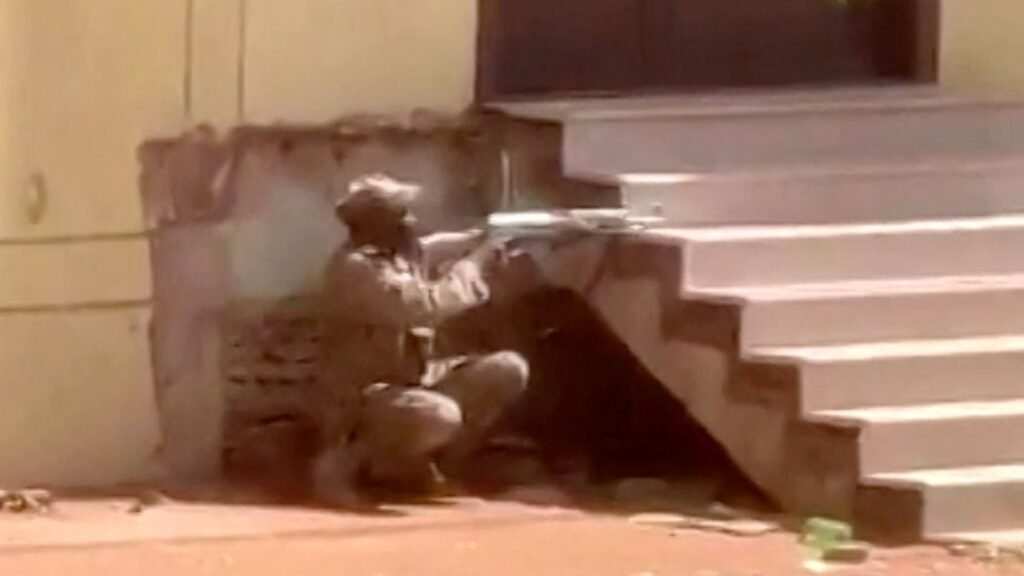Since the early hours of April 15th, the Sudanese Armed Forces (SAF) and a paramilitary group, the Rapid Support Forces (RSF) have been engaged in clashes.
The violence that has erupted in the Sudanese capital, Khartoum, and elsewhere in the country is directly attributable to a vicious power struggle among the military leadership.
Members of a paramilitary force, Rapid Support Forces (RSF), and Sudanese army are engaged in conflict at strategic locations throughout the capital. RSF was a militia during the height of the Darfur conflict but has recently integrated with the formal military.
The current scenario
The combat escalated throughout the day, including the use of heavy weapons, air force fighters, and helicopters, in Khartoum, the capital of Sudan, and other cities.
In a series of statements, the RSF reported that the SAF had attacked its base in southern Khartoum and acquired control of the city’s airport and the Republican Palace, which serves as the presidential residence.
You can also read: Why UK is joining trans-pacific trade pact?
The SAF published a statement claiming that the RSF initiated the fighting by attacking its forces in southern Khartoum and the residence of SAF commander-in-chief Abdel Fattah Al-Burhan. Another statement refuted the RSF’s claims and referred to them as a dissident force.
As the conflict escalates, the SAF and RSF have made contradictory claims regarding control of strategic positions such as Khartoum and Merowe airports and the television and radio building in Khartoum. Currently, it is nearly impossible to confirm the veracity of any of these claims.
Additionally, each party has been shutting the door on any possibility of a compromise. The SAF stated in a statement that no negotiations would take place until the RSF was “decimated and dissolved”, while the commander of the RSF, Mohamed Hassan ‘Hamedti’ Dagalo, claimed that the RSF’s objective is to put Al-Burhan on trial.
As the violence continues, Khartoum and the rest of Sudan are in disarray, with power outages, road closures, and flight cancellations. The Sudanese air force advised citizens to remain indoors while it conducted what it termed an aerial survey of RSF activity, and a holiday was proclaimed for Sunday in Khartoum state, closing schools, banks, and government offices.
The casualties rise
Gunfire and explosions were heard throughout the capital, where television footage showed smoke rising from multiple districts and social media footage captured military jets flying low over the city, with at least one appearing to fire a missile. The Sudanese Doctors’ Union reported that at least 56 civilians had been killed and 595 people, including combatants, had been injured since Saturday, when the violence broke out.

Background of the dispute
Tensions between the RSF and the SAF have been on the rise for months, but their origins date back to the 2019 ouster of former Sudanese president Omar Al-Bashir. Massive public rallies demanded an end to his near-three-decade rule, and the army staged a coup to remove him.
Moreover, Sudan has been governed by a council of generals since a coup in October 2021, and the dispute revolves around two military officers. General Abdel Fattah al-Burhan is the leader of the armed forces and, by extension, the president of the country. His deputy and RSF leader, General Mohamed Hamdan Dagalo, also known as Hemedti. They disagree on the country’s future course and the proposed transition to civilian rule.
The inclusion of the 100,000-strong RSF into the army and who would command the new force is one of the major sticking points.
In addition, the escalation of the current tensions can be traced back to an agreement that was proposed late last year with international support to put Sudan back on the path to democratic transition and civilian rule. The civilians had continued to demand a role in the democratic transition plan. Saudi Arabia, the United Arab Emirates, the United Nations, and the United States brokered this agreement.
Just the beginning?
The violence follows days of tension caused by the RSF’s redeployment across the nation, which the army perceived as a threat. There had been some optimism that negotiations could help resolve the situation, but they never occurred. Who fired the first shot on Saturday morning is unknown, but there are concerns that this will exacerbate an already volatile situation.
Political agreement at risk
The conflicts are a result of escalating tensions regarding the RSF’s integration into the military. The disagreement has delayed the signing of a transition to democracy agreement supported by the international community with political parties.
The alliance of civilian groups that signed a draft of this agreement in December demanded an immediate cessation of hostilities on Saturday in order to prevent Sudan from stumbling on the “precipice of total collapse.” “This is a pivotal moment in the history of our country,” they said in a statement. “This is a war that no one will win, and that will destroy our country forever.”
The RSF accused the army of collaborating with former strongman President Omar Hassan al-Bashir’s supporters, who were expelled in a coup in 2019, and attempting a coup themselves.
The RSF shared a video claiming to show Egyptian soldiers who “surrendered” to them in Merowe. Egypt stated that the forces were conducting exercises with their Sudanese counterparts in Sudan. The video featured men in army fatigues speaking in an Egyptian Arabic dialect while kneeling on the ground. According to unconfirmed reports from open-source intelligence analysts, the RSF captured several Egyptian Air Force fighter aircraft and their pilots, as well as Sudanese weapons and military vehicles.
The United States, Russia, Egypt, Saudi Arabia, the United Nations, the European Union, and the African Union all demanded an immediate cessation of hostilities.
If the fighting persists, the country could become more fragmented, political unrest could worsen and ordinary Sudanese could be forced to endure another year of unpredictability.


